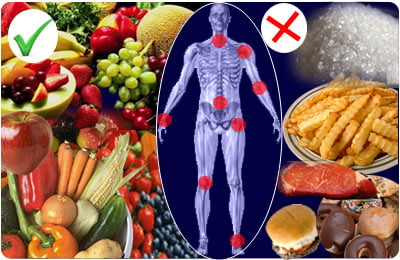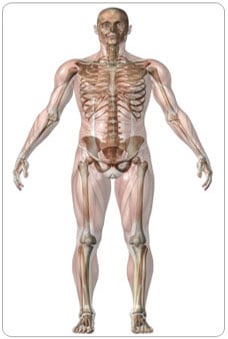- Bethesda, MD. Arthritis, National Institute of Arthritis and Musculoskeletal and Skin Diseases, 2009.
- Arthritis Foundation. Atlanta, 2009.
- Osteoarthritis, Life Extension
- You are what you eat: New theories about Rheumatoid Arthritis. Elizabeth Tracey, MS. Webmed health news.
About
Arthritis is a group of conditions that involves inflammation and pain in the joints. It typically occurs in joints of the body. It can affect other tissues in the body too. Arthritis can lead to joint weakness and physical ailments that can interfere with the daily activities. The pain associated with arthritis varies in severity. If it comes and goes, it is called episodic pain. When it is chronic, one would feel the pain most of the time.

Arthritis is a group of condition with similar manifestation but have different cause. The usual forms of arthritis are as follows:
- Osteoarthritis: This the most common form and is caused by long-time wear and tear of the joint and surrounding tissue.
- Rheumatoid Arthritis or RA: The inflammation starts after the immune system turns on itself and attacks the body. It affects tissue throughout the body. Bacteria, viruses, and parasites can trigger an immune response which further triggers inflammation.
- Gout: This type of arthritis develops as a result of high uric acid. People with gout form needle-shaped crystals in the joints, causing inflammation. The inflammation trigger attacks of severe pain lasts for weeks. Gout usually affects the toes, but can also occur in the feet, hands and the wrists. During an attack, the area affected becomes swollen, hot and tender.
- Ankylosing Spondylitis: It is a condition that mostly affects the spine. Inflammation causes the bones of the spine to fuse together.
- Juvenile Arthritis: It is a form of Rheumatoid arthritis that occurs in teen aged children.
The value of nutrients in arthritis is not so well known and its knowledge can help in reduction of symptoms and decrease the requirement of daily medication. The dietary guidelines for people with arthritis include foods rich in natural anti-inflammatory, antioxidant, and joint-supporting nutrients, and avoiding pro-inflammatory foods that are high on sugar, saturated fats, and trans-fatty acids.
So, if you are suffering from arthritis Consume:
- Fruits such as cherries, cranberries, blueberries, blackberries, pears and prunes (cooked or dried)
- Cooked green, yellow and orange vegetables such as broccoli, cabbage, cauliflower, asparagus, lettuce, spinach, chard, collards, string beans, carrot, pumpkin, sweet potatoes and squash
- Legumes such as black beans, chickpeas, kidney beans, peas and soybeans
- Brown rice
- Olive oil
- Plain or carbonated water
- Vitamin E (400 IU) and flaxseed oil (1 tablespoon)
Food to Avoid:
- Fruits such as bananas, peaches, or citrus fruits
- Minimize meat, dairy, eggs and butter intake
- Potatoes, tomatoes, eggplants
- Herbal teas and beverages such as coffee (they can be triggers)
- Wheat, oats, rye, corn
New findings indicate that grains could encourage the development of rheumatoid arthritis wherein the immune system attacks the body’s own joints. Cereal grains are known to contain substances called as lectins. Grains could trigger lectin secretion from the gastrointestinal tract leading to an immune response and affecting the joints.
According to the lead researcher Cordian at the Colorado State University in Fort Collin the findings need to be further researched. Cereals being the bulk of our diets should only be given up or replaced if an allergy for any cereal is suspected and confirmed. Any suspect food could be eliminated for a period of time to be able to identify the causal food.
If a wheat protein allergy exists than other grains like rice, millets, buckwheat, quinoa could be consumed. Dairy protein allergy should also be looked for. Milk and milk products have to be avoided if the latter exists in people affected by Rheumatoid arthritis.
Apart from the food allergies it is essential to focus on a vegetarian diet, cut down on saturated fats, consume omega 3 rich foods, lose weight and exercise.
Also remember spices, such as ginger, garlic, turmeric and cumin, show anti-inflammatory effects. They block production of prostaglandins.
In short, people with arthritis should identify and avoid foods that trigger inflammation. Also it is beneficial to lower the daily caloric intake for pain-free living.
 MEDINDIA
MEDINDIA
 Email
Email






